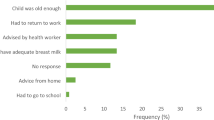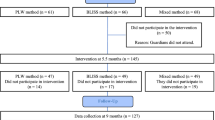Abstract
Background/objectives:
Many parents do not follow recommendations for the timing of introduction of complementary feeding. The aim of this study was to identify determinants associated with the timing of introduction of complementary feeding in a multiethnic birth cohort.
Subjects/methods:
Subjects were 3561 mothers and infants participating in a prospective cohort study. The timing of introduction of complementary feeding and maternal and infant characteristics were obtained by parent-derived questionnaires. Regression analyses were performed to identify determinants for the timing of introduction of complementary feeding (<3, 3–6 and ⩾6 months).
Results:
In total, 62% of infants were introduced to complementary feeding before the age of 6 months. Determinants for very early (<3 months) introduction were being a single parent and infant day care attendance. Determinants for early (3–6 months) introduction were young maternal age, multiple parities, no infant family history of asthma, atopy and no infant history of allergy to cow's milk. Determinants for both very early and early introduction were low educational level and not fully breastfeeding for 4 months. Maternal educational level was only significantly associated with the timing of introduction in mothers of Western origin.
Conclusions:
This study confirmed determinants for the timing of introduction of complementary feeding that have been identified by previous studies, which may be appropriate targets for education and guidance. Moreover, mothers whose infants attend day care and have a family history of asthma, atopy or allergy to cow’s milk may need guidance to follow infant feeding recommendations.
This is a preview of subscription content, access via your institution
Access options
Subscribe to this journal
Receive 12 print issues and online access
$259.00 per year
only $21.58 per issue
Buy this article
- Purchase on Springer Link
- Instant access to full article PDF
Prices may be subject to local taxes which are calculated during checkout
Similar content being viewed by others
References
Grummer-Strawn LM, Scanlon KS, Fein SB . Infant feeding and feeding transitions during the first year of life. Pediatrics 2008; 122: S36–S42.
World Health Organization. Global Strategy for Infant and Young Child Feeding. World Health Organization: Geneva, Switzerland, 2003.
Wijndaele K, Lakshman R, Landsbaugh JR, Ong KK, Ogilvie D . Determinants of early weaning and use of unmodified cow's milk in infants: a systematic review. J Am Diet Assoc 2009; 109: 2017–2028.
Scott JA, Binns CW, Graham KI, Oddy WH . Predictors of the early introduction of solid foods in infants: results of a cohort study. BMC Pediatr 2009; 9: 60.
Agostoni C, Decsi T, Fewtrell M, Goulet O, Kolacek S, Koletzko B et al. Complementary feeding: a commentary by the ESPGHAN Committee on Nutrition. J Pediatr Gastroenterol Nutr 2008; 46: 99–110.
Schiess S, Grote V, Scaglioni S, Luque V, Martin F, Stolarczyk A et al. Introduction of complementary feeding in 5 European countries. J Pediatr Gastroenterol Nutr 2010; 50: 92–98.
Kuo AA, Inkelas M, Slusser WM, Maidenberg M, Halfon N . Introduction of solid food to young infants. Matern Child Health J 2011; 15: 1185–1194.
Przyrembel H . Timing of introduction of complementary food: short- and long-term health consequences. Ann Nutr Metab 2012; 60: 8–20.
Szajewska H, Chmielewska A, Pieścik-Lech M, Ivarsson A, Kolacek S, Koletzko S et al. Systematic review: early infant feeding and the prevention of coeliac disease. Aliment Pharmacol Ther 2012; 36: 607–618.
Thulier D, Mercer J . Variables associated with breastfeeding duration. J Obstet Gynecol Neonatal Nurs 2009; 38: 259–268.
van Rossem L, Vogel I, Steegers EA, Moll HA, Jaddoe VW, Hofman A et al. Breastfeeding patterns among ethnic minorities: the Generation R Study. J Epidemiol Community Health 2010; 64: 1080–1085.
van Rossem L, Oenema A, Steegers EA, Moll HA, Jaddoe VW, Hofman A et al. Are starting and continuing breastfeeding related to educational background? The generation R study. Pediatrics 2009; 123: e1017–e1027.
Rebhan B, Kohlhuber M, Schwegler U, Koletzko BV, Fromme H . Infant feeding practices and associated factors through the first 9 months of life in Bavaria, Germany. J Pediatr Gastroenterol Nutr 2009; 49: 467–473.
Griffiths LJ, Tate AR, Dezateux C, Millennium Cohort Study Child Health Group. Do early infant feeding practices vary by maternal ethnic group? Public Health Nutr 2007; 10: 957–964.
Jaddoe VW, van Duijn CM, Franco OH, van der Heijden AJ, van Iizendoorn MH, de Jongste JC et al. The Generation R Study: design and cohort update 2012. Eur J Epidemiol 2012; 27: 739–756.
Hulshof K, Breedveld B . Results of the study on nutrient intake in young toddlers. TNO Nutrition Zeist: The Netherlands, 2002.
Statistics Netherlands. Dutch Standard Classification of Education 2003. Statistics Netherlands: Voorburg/Heerlen,, 2004.
Swertz O, Duimelaar P, Thijssen J . Migrants in the Netherlands. Statistics Netherlands: Voorburg/Heerlen, 2004.
Sterne JA, White IR, Carlin JB, Spratt M, Royston P, Kenward MG et al. Multiple imputation for missing data in epidemiological and clinical research: potential and pitfalls. BMJ 2009; 338: b2393.
Grimshaw KE, Allen K, Edwards CA, Beyer K, Boulay A, van der Aa LB et al. Infant feeding and allergy prevention: a review of current knowledge and recommendations. A EuroPrevall state of the art paper. Allergy 2009; 64: 1407–1416.
Acknowledgements
The Generation R Study is conducted by the Erasmus Medical Center in close collaboration with the School of Law and Faculty of Social Sciences of the Erasmus University Rotterdam, the Municipal Health Service–Rotterdam Metropolitan Area, the Rotterdam Homecare Foundation, and the Stichting Trombosedienst and Artsenlaboratorium Rijnmond. This phase of the Generation R Study was supported by the Erasmus Medical Center, the Erasmus University Rotterdam, the Netherlands Organization for Health Research and Development (Zon Mw) and Europe Container terminals BV. We acknowledge the contributions of children and parents, general practitioners, hospitals and midwives in Rotterdam.
Disclaimer
The funders had no role in the design of the study, data collection and analyses, interpretation of data, preparation, review and decision to submit the manuscript.
Author information
Authors and Affiliations
Corresponding author
Ethics declarations
Competing interests
Oscar H Franco is the recipient of a grant from Pfizer nutrition to establish a new center on ageing research (ErasmusAGE).
Additional information
Contributors: Involvement in the design, planning and conducting the study and data collection: HAM, HR, AH, VWVJ, IIM, JCK, SB. Statistical analyses and interpreting data: SB, JCK. Drafting the final manuscript: IIM, SB, JCK, HAM. Critical revision of the manuscript for important intellectual content: CMR, OHF. All authors critically reviewed the manuscript.
Supplementary Information accompanies this paper on European Journal of Clinical Nutrition website
Supplementary information
Rights and permissions
About this article
Cite this article
Tromp, I., Briedé, S., Kiefte-de Jong, J. et al. Factors associated with the timing of introduction of complementary feeding: the Generation R Study. Eur J Clin Nutr 67, 625–630 (2013). https://doi.org/10.1038/ejcn.2013.50
Received:
Revised:
Accepted:
Published:
Issue Date:
DOI: https://doi.org/10.1038/ejcn.2013.50
Keywords
This article is cited by
-
The effect of parity on time to initiate complementary feeding among mother-infant pairs in Awi Zone, Northwest Ethiopia
Italian Journal of Pediatrics (2024)
-
Determinants for early introduction of complementary foods in Australian infants: findings from the HSHK birth cohort study
Nutrition Journal (2020)
-
Factors associated with early introduction of complementary feeding and consumption of non-recommended foods among Dutch infants: the BeeBOFT study
BMC Public Health (2019)
-
Maternal knowledge and attitudes towards complementary feeding in relation to timing of its initiation in rural Bangladesh
BMC Nutrition (2019)
-
Vitamin D intake of Dutch infants from the combination of (fortified) foods, infant formula, and dietary supplements
European Journal of Nutrition (2017)



